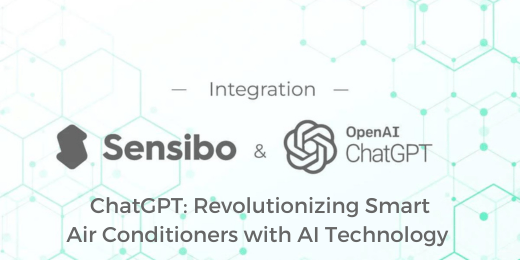ChatGPT: Revolutionizing Smart Air Conditioners with AI Technology

In recent years, the rapid advancements in artificial intelligence (AI) have permeated various aspects of our lives, transforming how we interact with technology. With the release of ChatGPT, we have seen a collective surge in the integration of AI into our everyday lives. One such area witnessing fast development of progress is the smart air conditioning market. In this blog, we will explore how ChatGPT is making strides in smart air conditioners, reshaping the way we control and optimize our indoor environments.
The Growth of Smart ACs
Most of the air conditioners that you find today are very similar to the ones used 20 years ago. The AC space is known for a slow innovative process where few things have changed over the years. But things are changing.
The wants of people and of the climate have slowly called for innovation in the space and in the last few years, the industry has seen new technologies take over the heating & cooling market. For users of AC, it means a more convenient way to manage your cooling, whether you’re at home or on the go. For the environment, it means a more optimized and streamlined approach to AC usage, drastically cutting down on energy waste and reducing the amount of carbon emissions released by AC & heating. This growth has come from both within the existing manufacturers, as well as companies that are pushing the industry with fast-paced innovation with smart controllers that can even turn older units into smart, tech-driven machines.
This rapid move to smart ACs is expected to grow even more in the coming years for two reasons. One, the rise in adoption of AC usage around the world has been climbing and has surged due to extreme weather events such as heatwaves. Two, as the technology improves and new technology comes to market, more and more people are expected to join the rush and innovate their air conditioning to get the benefit of more comfort, as well as have a positive effect on the environment. One of these technologies is AI. While AI has in some ways been incorporated into smart ACs for years, the release of ChatGPT and other generative AI technologies has already seen significant new integrations of the two technologies.
How ChatGPT Is Revolutionizing Smart Air Conditioners
In the words of Sensibo CEO & Co-Founder Ran Roth, “We are at the beginning of a revolution….. Generative AI is something we [Sensibo] are very excited about. I am very excited because I think a lot of companies will do amazing things with AI and machine learning, especially in the IoT and energy space.”
Energy efficiency has become a critical concern in the face of climate change and with the volatility of the energy market. Here, ChatGPT has already started playing a pivotal role in optimizing smart air conditioner operations. By analyzing historical data and real-time environmental inputs, the AI model can intelligently suggest the most energy-efficient temperature settings and operation modes. Moreover, ChatGPT can learn from user feedback and patterns, continuously improving its energy-saving recommendations to reduce electricity consumption without compromising comfort. Generative AI excels at taking loads of data, such as from the many sensors of smart air conditioners, and turning that data into useful information that smart ACs and connected IoT solutions can leverage. Companies like Sensibo, have already integrated ChatGPT into their software offering to allow users to get recommendations based on the user’s behavior patterns, such as an automated AC schedule based on custom behavior of the user and smart triggers based on personal preferences that the AI has gleaned from the data.
Optimizing AC usage by user behavior pattern
One of the most remarkable features that ChatGPT has unlocked for smart air conditioners is their ability to anticipate users' needs. Drawing insights from historical usage patterns, weather forecasts, and user preferences, AI models, such as the ones integrated into Sensibo software, can predict when users are likely to require cooling and adjust the temperature accordingly. These smart schedules not only enhance user comfort but also ensure that the air conditioner operates proactively, saving energy by avoiding unnecessary cooling during unoccupied periods. Another way in which Sensibo is utilizing the integrations of AI is to react to the surrounding environment or “climate react”. Based on the environment's temperature humidity, outside temperature, and more, climate react will adjust its operation to maximize the comfort of the room.
Integration with Smart Homes: The Power of Interconnectivity
The rise of the Internet of Things (IoT) has facilitated the creation of interconnected smart home ecosystems and heating and cooling play a major role in the home's energy use. “Heating and cooling sounds like a niche part of overall energy use, but it’s really the thing that uses the most energy in our homes” said Ran Roth in an interview on the IoT Podcast. He continued, “heating and cooling are responsible for 25% of energy use worldwide; 53% of energy in the US, and 67% in Europe”.
ChatGPT can seamlessly integrate with various smart devices. This interconnectedness not only enhances user convenience but also allows ChatGPT to collaborate with other smart devices, such as smart thermostats, smart lighting, and smart blinds, to create a cohesive and energy-efficient living environment. We have already seen how a seamless integration of different devices can enhance user experience with the rollout of the Matter protocol (which our new devices now support) and this ChatGPT integration is yet another way to improve not only user experience but the entire smart home ecosystem.
Many smart devices already enable remote management so that your home or office can provide maximal comfort from when you walk in and with these new AI integrations and the advancements that have already been made in a short time, the potential seems endless for the integration of generative AI into our homes, particularly in the realm of cooling and heating.
Sensibo Integrates ChatGPT Into Its Smart AC Controllers
Earlier this year, Sensibo, announced the integration of ChatGPT into all it’s smart AC products.
“It’s not just about telling you, we're actually using it to replace the predictive model in some instances” says Roth. The integration has already received positive reviews from customers. The integration pushes Sensibo’s innovation forward and continues the mission to drive energy efficiency for its users, which on average, users see 20% savings.
The integration of Sensibo with ChatGPT brings a seamless synergy between smart Heating and Cooling control and other intelligent modules within the Sensibo software, available for Sensibo Plus users. For example, with Optimus, machine learning algorithms detect anomalies such as open windows and provide energy-saving recommendations, creating a more efficient and comfortable environment. Additionally, the Statistics module offers comprehensive daily, weekly, monthly, and yearly data, enabling users to optimize AC usage, conserve energy, and compare their efficiency to other users. Finally, the Health Check feature runs diagnostics on your AC units, providing valuable feedback on their performance and room temperature retention, ensuring your Heating and Cooling system operates at its best.
These enhanced capabilities make ACs smarter by adding more sensors and by allowing for increased computational power and advanced algorithms to convert the collected data into actionable insights.
Data Analysis from Heatwaves Shows Increase in AC Usage
Recent data from Sensibo has shown an increase in the average number of hours air conditioning has been used in many major cities around the world.
Lisbon saw a 41% increase in AC usage during the summer of 2023 as compared to 2022. Berlin, a 28% rise, Seville 26.5%, with similar numbers being seen in US cities like Seattle and Phoenix.
Sensibo’s ChatGPT integration gives the ability for large amounts of data to be sorted and processed in a quick and efficient manner, to provide ways to optimize AC usage based on this data analysis. This can lead to more efficient cooling, reducing energy bills for users and decreasing the amount of CO2 emitted as a result of at-home cooling.
Conclusion
“We’re very impressed with the results we’ve seen so far. I’m very excited about the future of ChatGPT in Sensibo and in the IoT space” said Roth to close out the interview.
ChatGPT's integration with smart air conditioners is revolutionizing the way we experience indoor climate control. By leveraging AI technology, these systems provide personalized comfort, optimize energy efficiency, anticipate user needs, and seamlessly integrate with smart homes, offering unparalleled convenience and sustainability. As AI continues to advance, we can expect even more innovative applications and improvements in the realm of smart air conditioning, ultimately shaping a greener and more comfortable future for us all. Sensibo is at the forefront of this revolution and hopes to be pushing out more updates with it’s ChatGPT integration soon.



































.jpg?height=200&name=photo_2024-07-05_21-25-23%20(1).jpg)
-min%20(1).jpg?height=200&name=shutterstock_1616234788%20(1)-min%20(1).jpg)




